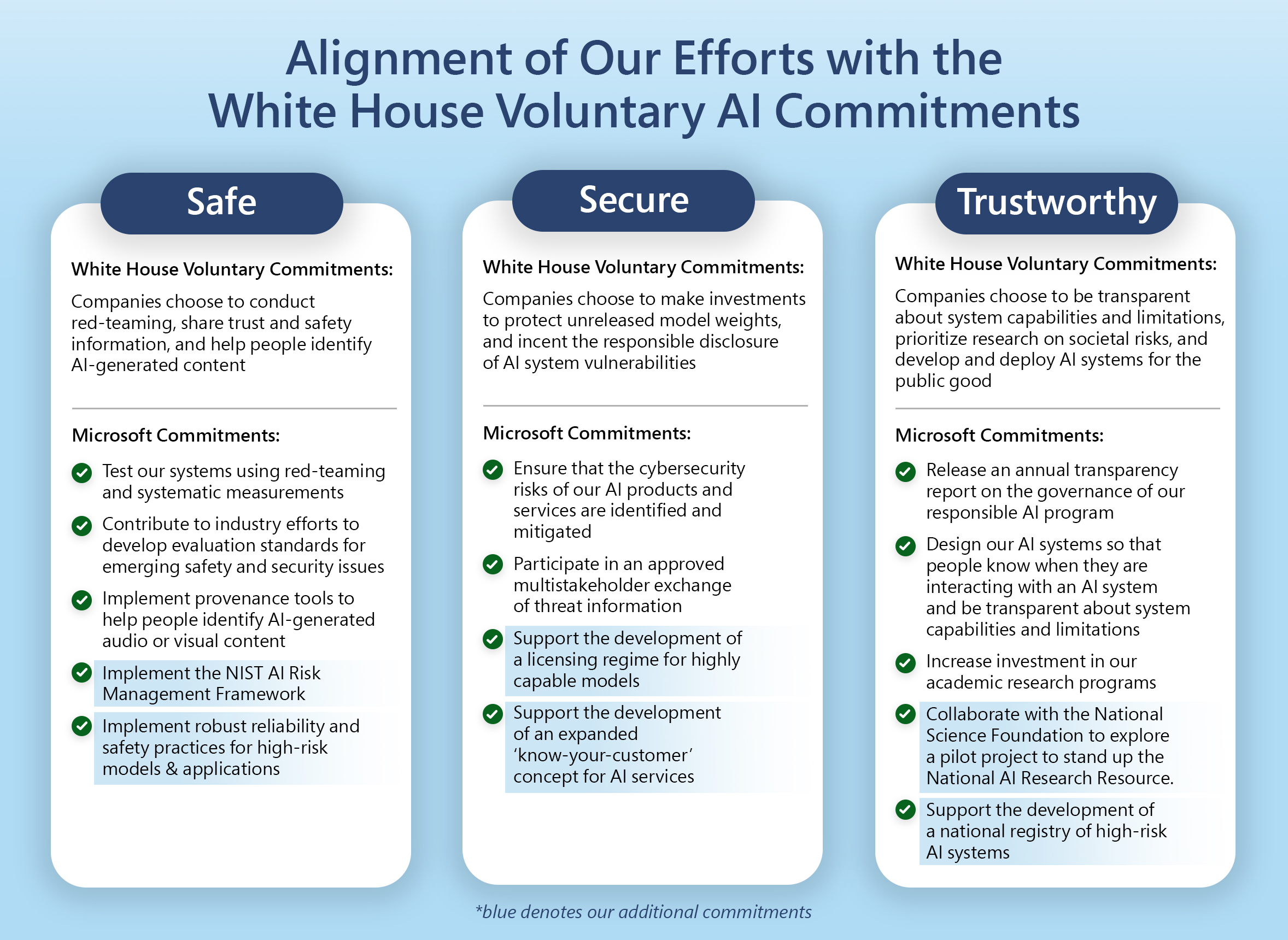7
Microsoft's AI Safety Policies - Microsoft On the Issues
Original article seen at: blogs.microsoft.com on October 26, 2023

tldr
- 💡 Microsoft works closely with OpenAI to develop responsible AI systems.
- 💡 The joint Deployment Safety Board (DSB) reviews model capability and risk management processes.
- 💡 Microsoft emphasizes transparency and provides context to stakeholders through product features and documentation.
- 💡 The company collaborates with industry partners and contributes to initiatives like the Coalition for Content Provenance and Authenticity (C2PA).
- 💡 Microsoft invests in AI research, collaborates with academic institutions, and supports the development of AI computing resources.
summary
Microsoft has shared information about its responsible artificial intelligence (AI) development and deployment practices. The company works closely with OpenAI to develop advanced AI systems and implements multi-layered governance to manage risk. Microsoft and OpenAI have defined capability thresholds for reviewing frontier models before release or deployment. The joint Deployment Safety Board (DSB) reviews model capability and risk management processes. Microsoft also conducts independent safety reviews prior to product release. The company operates a multi-tiered responsible AI governance approach, including the Responsible AI Council. Microsoft supports the establishment of a globally coordinated licensing regime for highly capable frontier models. The company conducts red teaming exercises to identify vulnerabilities and improve model development and deployment processes. Microsoft emphasizes transparency and provides context to stakeholders through product features, documentation, and transparency reports. The company collaborates with industry partners and contributes to initiatives like the Coalition for Content Provenance and Authenticity (C2PA). Microsoft invests in AI research, collaborates with academic institutions, and supports the development of AI computing resources. The company maintains robust cybersecurity practices and implements security measures to protect AI systems and data. Microsoft actively engages in vulnerability disclosure and bug bounty programs. The company is committed to responsible data policies and practices, including privacy and security standards. Microsoft's responsible AI practices are implemented throughout the product lifecycle, and the company continuously learns and improves its approach.starlaneai's full analysis
Microsoft's commitment to responsible AI development and deployment practices, as highlighted in the article, demonstrates the company's dedication to ensuring the responsible use of AI technology. The collaboration with OpenAI and the establishment of the joint DSB showcase Microsoft's efforts to review model capability and manage AI risks. By emphasizing transparency and providing context to stakeholders, Microsoft aims to build trust and enable responsible AI adoption. The company's investment in AI research and collaboration with academic institutions contribute to advancing the field and fostering a vibrant global AI research community. However, challenges may arise in implementing responsible AI practices, such as addressing potential ethical concerns and ensuring compliance with data privacy and security laws. Competitors and collaborators in the AI industry may also play a significant role in shaping the future of responsible AI development. Overall, Microsoft's responsible AI practices and collaborations have the potential to positively impact the AI industry and society as a whole, driving advancements in AI technology while prioritizing ethical considerations and transparency.
* All content on this page may be partially written by a clever AI so always double check facts, ratings and conclusions. Any opinions expressed in this analysis do not reflect the opinions of the starlane.ai team unless specifically stated as such.
starlaneai's Ratings & Analysis
Technical Advancement
80 The technical advancement in the article is significant, as Microsoft's responsible AI practices and collaboration with OpenAI demonstrate progress in developing and deploying AI systems responsibly.
Adoption Potential
25 The adoption potential of the discussed AI innovation is moderate, as it requires multi-layered governance and collaboration with OpenAI. However, Microsoft's commitment to responsible AI and transparency can contribute to wider adoption.
Public Impact
75 The news has a high public impact, as Microsoft's responsible AI practices aim to ensure the development and deployment of AI systems that benefit society while addressing potential risks and harms.
Innovation/Novelty
60 The article's content is moderately novel within the AI industry, as it highlights Microsoft's specific approach to responsible AI development and deployment, including the joint DSB and collaboration with OpenAI.
Article Accessibility
70 The information in the article is accessible to a general audience, as Microsoft emphasizes transparency and provides context through product features, documentation, and transparency reports.
Global Impact
40 The global impact of the discussed AI solution is moderate, as Microsoft's responsible AI practices can contribute to addressing global challenges and promoting cross-border collaborations.
Ethical Consideration
65 The article covers ethical aspects and potential controversies to a moderate extent, discussing responsible AI development, potential risks, and mitigations. However, further exploration of ethical concerns could enhance the analysis.
Collaboration Potential
85 The collaboration potential of the discussed AI innovation is high, as Microsoft collaborates with OpenAI, industry partners, and academic institutions to advance responsible AI practices and contribute to initiatives like the C2PA.
Ripple Effect
60 The potential ripple effect of the discussed AI solution is moderate, as it can affect adjacent industries, spark interdisciplinary collaborations, and contribute to solving global challenges.
Investment Landscape
70 The discussed AI innovation can have a moderate impact on the AI investment landscape, attracting investments and driving advancements in responsible AI practices.
